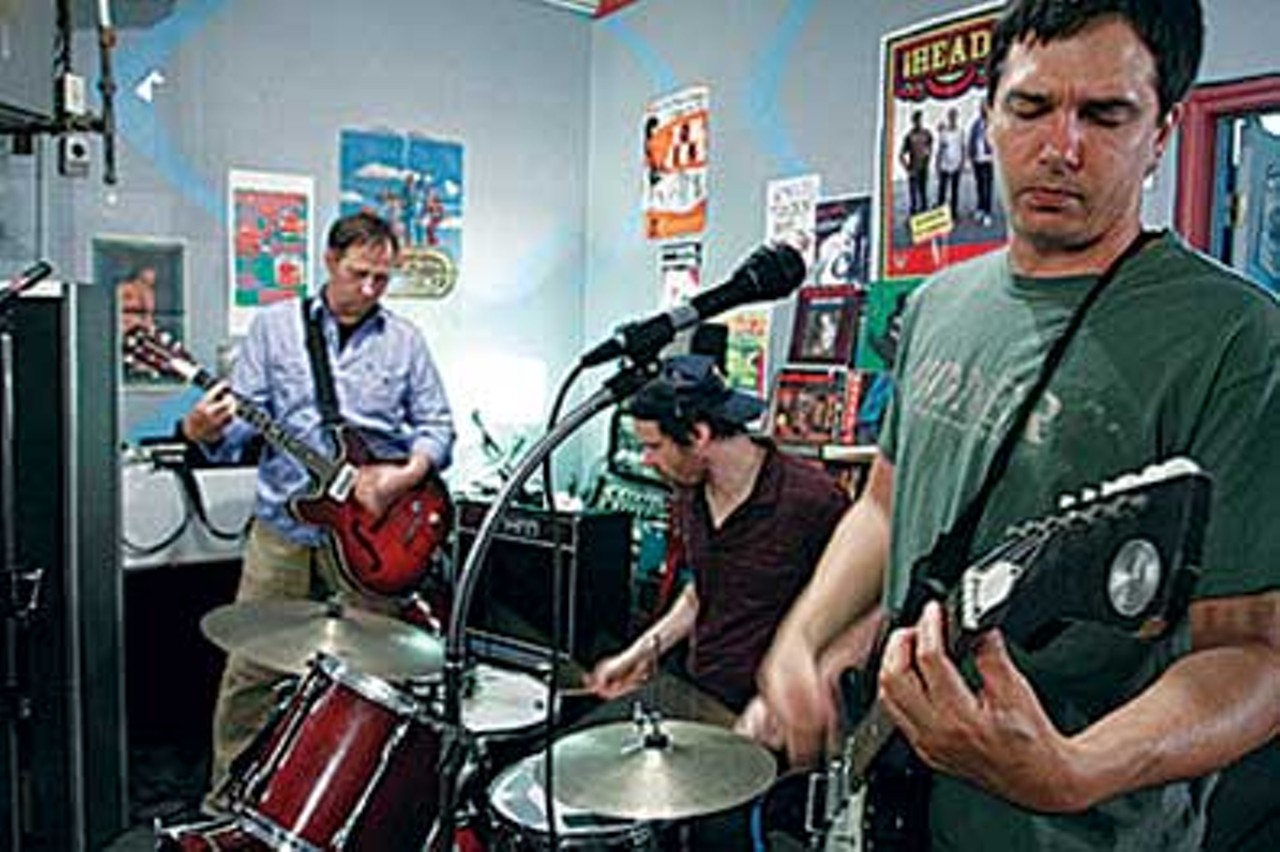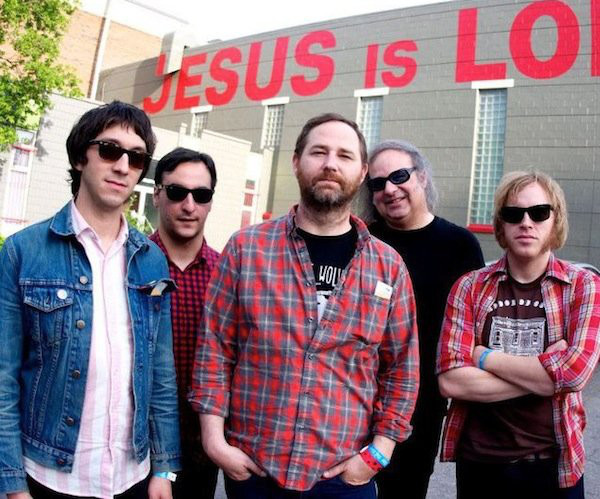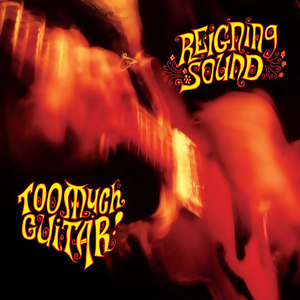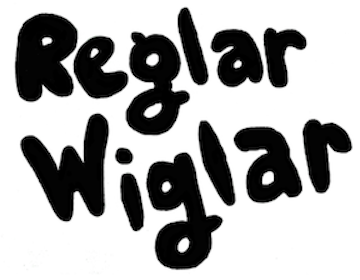Two Sides to Every BandGreg Cartwright & the Reigning SoundArticle by Mike Dixon Published in Reglar Wiglar #20, 2004
The Reigning Sound is the sound that reigns. It's the sound of good lovin' gone bad and bad lovin' gone good. The sound that reins leaves a stain on your brain. And that's no reason to complain. Now that rock and roll is a half-century old, It's good to know that someone's out there making sure it still gets done right once in a while. The old fire still burns bright at the command of Greg Cartwright and his band, the Reigning Sound. The Reigning Sound presents an unusual proposition to today's music world. they're an actual, honest-to-gosh rock and roll band. They deliver the music straight from the gut, without a trace of irony, smarm, or gimmick. While much of the garage rock, um, scene wallows in a macho fashion show of ludicrous rawk posturing and an unresolvable sweating contest, Cartwright, drummer Greg Roberson, and bassist Jeremy Scott are content to deliver their music unadorned by flaming dice tattoos, white trash fetishism, or ironic "Kick out the jams, brothers and sisters" schtick. Reigning in the Sound & Spirit of Rock & RollGreg's low-key, aw-shucks personability and penchant for button-down sweaters may seem at odds with his on-stage demeanor, where he spits and snarls and howls his lyrics and looks like he's having a seizure or being electrocuted by his own guitar. Or possessed by (get ready, this is gonna be a bit corny, but it's the best I can do) the spirit of rock and roll. It's rock and roll as religious revival, spiritual awakening, etc. BUT it's not some goofy preacher man put-on. These guys are true believers. The thing is, right now, Greg Cartwright and the Reigning Sound are rock and roll. Up 'til now, Greg's been best known for his years of collaboration with Jack Yarber [1]. In the Compulsive Gamblers, Greg and Jack dealt a fine, uniquely rich and soulful spookhouse Americana that recalled everything from Dylan to Danzig. The Gamblers put out a pair of EPs and a single [2] that went virtually unheard outside their hometown of Memphis, before cashing in their chips in 1993.
Into the ObliviansThe Compulsive Gamblers kaput, Greg and Jack recruited local hoodlum Eric Freidl and started a new band, which they called the Oblivians. Rock and roll, Oblivian-style, was stripped to its foulest essentials. It was all forward-propelled chaos, dirty and distorted to the point of absurdity. They adopted the tried and true blues-punk [3] guitar-drums-no bass template set by Hound Dog Taylor, and followed by the Cramps, Gories, and many, many others. The fact that all three Oblivians wrote and sang their own songs led to a novel approach: they took turns on drums. Live, they worked without a set list, and the split second between song necessitated a lightning fast quick-change stunt that was almost as exciting as the raucous music. The band lasted four very prolific years, and just got better and better with each record. Each dude brought his own personal style of songwriting to the table. According to Eric, Greg wrote the songs that makes the whole world sing (ex.: "Bad Man," "Part of Your Plan"), and Jack wrote the songs that make the whole world dance ("Do the Milkshake," "Strong Come On), while he himself wrote the songs that make the whole world hate ("Guitar Shop Asshole," "And Then I Fucked Her"). Their final album was called The Oblivians Play 9 Songs With Mr. Quintron. It paired four traditional numbers with five Cartwright originals reflecting his recent infatuation with gospel music. The final product, rehearsed and recorded in one day with the genius Quintron sitting in on organ, felt closer in spirit to the Gamblers, but was essentially a Greg Oblivain solo album. The Oblivians, whose style by this time was being aped by lesser bands all over the world, had reached a creative dead-end [4]. So . . . The Return of the Compulsive GamblersThe Compulsive Gamblers resurfaced in 1999 with an album called Bluff City. Expectations being what they are, and in the hangover of the Oblivians crazed primitivism, two standout cuts, both written and sung by Greg Cartwright "I Don't Want To Laugh At You" and "New Romance" were shocking for the way they tugged the heartstrings. "Crystal Gazing, Luck Amazing" soon followed, and is a no-two-ways-about-it masterpiece. Greg: "After the Oblivians, Jack and I did the Gamblers for two more records. We started out on a tour, and our van broke down about six times and we called the tour a washout and we went home and that was the end of the Compulsive Gamblers. So, after that, I kind of waited a while and tried to figure out what I wanted to do next. I wanted to veer away from what I normally do, explore different things, try to figure out what I was going to do with the next few years of my musical life..." Cartwright had been producing records for like-minded raw & raucous rock bands like the Horrors, the Detroit Cobras and the Porch Ghouls for a while, and often pitched in some guitar and background vocals to the recordings. He recorded the first album by Toronto's Deadly Snakes, and joined the band officially for the second one [5]. He toured with them for a few months, but it made little sense for a Tennessee boy to be a member of a Canadian band. Greg soon bid the Snakes adieu to order to follow his own muse. Back in Memphis, Greg started to think about where to go next. He knew he wanted to do something different than people may've been expecting of him. "I met this guy Greg Roberson. He had just moved back to town he had moved out to L.A [6]. for a few years. He said, Man, I'd love to get together and play sometime, I play drums'. He had met this guy Jeremy Scott, probably in a bar or something. Jeremy was from New Jersey, and he played guitar. Greg said Why don't you come and play with Greg Cartwright and I sometime?, He did and I said Well here's the thing, I need a bass player. I don't really need another guitar player ', and he said, Oh, well, I'd be willing to give it a shot'. So, both the drummer and the bass player had just recently moved to town. And that was kind of refreshing to me because, you know, rock and roll scenes in any given town can be a bit incestuous after a while. The Compulsive Gambers Bring New BloodThe new blood was essential to Greg's plan to do upend expectations. "You wind up treading the same ground over and over and over and over again, and that's something I definitely don't want to do. Both Greg and Jeremy are really into a lot of indie rock and power pop and I thought, This is good. This is what I'm kind of looking to do., I want to get with some people who have no musical expectations for what I do. People who aren't even really familiar with the Oblivians records, or the Gamblers. And that way, whatever I throw at them, they'll react to it in a first state sense. Like they're hearing what I do for the first time, and they'll expand on that with their own part instead of just mimicking something that Jack might do. The New ReignThe band worked up a bunch of songs, but still didn't have a name. And a rock band has to have a name. It's important, serious business [7]. "The name I wanted was The Reign. And then that same year that I came up with that name, Norton Records released a record by Johnny Thunders first teenage band. They cut one single in like 1968. The name of the band was The Reign. So I think, well, okay, if it was somebody else I could just take it and not feel bad about it, because so many names have been used a million times, but here this is Johnny Thunders' band. I've gotta find something else. So, I toyed with a couple of things and nothing ever really felt right. Actually, one of the first names of the band was The Time Bomb High School. I waffled on it, tried a couple of different things, and I kept going back to The Reign. I thought, maybe if I just alter it, then I can keep it. The Reigning Sound debuted in 2001. With the addition of Alex Greene on organ, the band's sound was even further-flung from the Oblivians turf than the Compulsive Gamblers had been. While fans may have been expecting a certain down and dirty, bluesy grit, the sound on their first album, Break Up, Break Down is big and deep and far-reaching as an AM radio signal. The tempos are much slower than before. The songs have time to breathe, and you can hear the space between the players, their instruments, and each other. While the Compulsive Gamblers (and very very rarely, the Oblivians) dabbled in tenderness, those moments were the exceptions rather than the rules. Those outfits were best known as merchants of burning hellfire. Here now was a band with a collection of songs whose hardest-rocking moment was a semi-rollicking take on a lesser-known cut from Pet Sounds [8] called "Waiting For the Day.
Hurts So MuchGreg's vision was for the album to be a detailed song-cycle about a dissolving romance. It ambles into existence with the love-her-so-much-it-hurts, declaration "So Thankful." From there, it plays like ticks off a grief counselor's checklist. The songs illuminate the phases and stages of the rebound. Anger, accusation, pity, remorse, and acceptance each get a turn before our narrator decides to leave town in the haunting album closer "Goodbye." But a funny thing happened on the way to the pressing plant. The songs were mistakenly listed in the wrong order on the original artwork for the back cover of the record. The vinyl version was pressed with the songs in the intended order, but when Sympathy Records honcho Long Gone John noticed the discrepancy he corrected it incorrectly. "He did the LP first, and he thought, oh, I got the sequence backwards when I mastered the record, so when he did the CD, he changed it. I don't know why it happened that way. So the CD was released with the songs out of order [9], but Cartwright the vinyl junkie is more disappointed at the fate of the Break Up Break Down record, "The LP mastering was weird, because there were certain songs that sound like it's dragging slightly, or like maybe the hole is off-center on the record even though it's not. I actually recalled the entire pressing of the LP, so if you've got one, you're kind of lucky. I mean, you're not lucky in a sense, because It's fucked up. "But there's not many floating around. In fact, I John shipped me the rest of them, which is over a thousand LP's, and they're in a closet in my house. I was like; You can't keep selling these. The mastering's fucked up and I don't want people to hear that., He just never got around to repressing it on vinyl." Time Bomb High SchoolA year later, the peerless In the Red label released Time Bomb High School. It wasn't as adventurous in concept as Break Up, but in a year the Reigning Sound had extended their reach tremendously. The ballads were there again, but they had some good old rock and roll to get out of their system too. Once again, the songs were reorganized for the CD and vinyl editions, but this time, it was on purpose. "They're two completely different formats CD and LP An LP, you listen to one side at a time, but with a CD, it's as a whole. So, with Time Bomb High School, the idea was, on the LP we'll put all the rockers on one side and put the more kind of pop songs on the flip. "So on the CD, it works better to have the different types of songs mixed together in one long continuity and not break it up, because people don't listen to CDs a side at a time. Or they listen to them randomly, or a track at a time, and the order isn't important. We still wanted to have a good sequence for that odd person who will play the whole thing all the way through, though." Steady touring and the wall-to-wall great songs on the new
album raised the band's public profile quite a bit. One pair of ears that pricked
up belonged to E Street Band guitarist and part-time Soprano Little Steven Van
Zant, who dubbed Time Bomb High School's "Straight Shooter" the "coolest song
in the world" and played it every week on his nationally syndicated "Underground
Garage" radio show. The honor is accepted with a healthy grain of salt. "It's
been very nice that he played the record and I want people to hear it, and that's
about the most I can really say." "I think he's trying to redefine the parameter of what garage is," says Greg of Miami Steve. "Major record labels right now really need somebody to do that. In the last three years or so, some really big record labels have spent a lllllllot of money, and put a lot of money on the bet that garage rock was going to be the next grunge as far as a new commodity to push and sell to teenagers [10]. "And it didn't really happen. Right out of the gate, they bought up all the big bands, but their records aren't selling any better than anybody else's. In fact, they were selling about the same as they would on a smaller label. They've been trying to do it for a long time, and it just doesn't work. The closest the youth culture ever got to having it's way was in the 60s, when young hipsters were working with older, established guys to get some closer approximation of what the kids really wanted onto records. "It was crazy in the 60s. It's absurd when you think that the MC5 was on a major label. Two major labels! That's unheard of today. These labels spend so much money on this being the next big thing. What they need, since word of mouth didn't do it for them, is some one like Steven who will go out there and say okay, you thirteen-year-olds, I know you don't know what garage is, but now I'm gonna tell you. It's this, this, this, and this, and this, and "It's kind of loosely connected to the Beatles and the Stones. And that's what's strange. Garage bands that I've played in forever, there was never any real parameter as to what garage was. Garage could be anything from Elvis Costello to something totally abrasive like the Oblivians. Or it could be something completely retro. But nobody had ever said, okay, It's this, this and this. He's kind of defining it so it can be an easily consumed product [11]." Hive MindOne band that did sell a lot of records is the Hives, who are part of a mutual admiration society [12] with the Reigning Sound. The two bands have toured together, and when the Oblivians played a one-off reunion earlier this year in Memphis, the Hives flew in from Sweden just to watch. "They're a grrreat live band. I've never toured with a band that was on a major label that treated us so well just as an opener," says Greg. "Every time we ever played with them, they were front and center out in front of us with everybody else just diggin' it, and vice versa when they would play. They put on an incredible show. It warms my heart to think that somebody like that can make records and sell a lot of them. It's good rock and roll music. There's nothing wrong with it." Too Much GuitarThe brand-new Reigning Sound album is called Too Much Guitar, and once again, It's chock full of that "good rock and roll music." The songs on the record are Greg's best yet, and the sonic pendulum makes the unexpected swing back into Oblivians territory. The sound is crude, abrasive, and a reminder of the unhinged primitivism that makes the best rock and roll so dang essential. It's a sound too much music, in these days of corporate-sponsored garage rock, glaring lacks.
A while back, rumors were going around that the Reigning Sound had broken up after recording what was to be their final album. The rumors were quashed after the band, now a three-piece, played a handful of shows and told folks that they planned to re-record the thing in an unusual place a record store. A few years earlier, Greg had opened the Legba Records as the business extension of his incurable vinyl habit. Greg explains: "What happened was, Alex Greene, who was our keyboard player, and on some songs he would play guitar, had a baby on the way, and we were all excited about it, but we knew it might be something that would come to play with the band long term. But he seemed to think that he could pull it off, swing everything, do his job, be at home enough Anyway, so we started recording the new record, and we did the whole thing, and I went in and mixed it. The night that I was through mixing, I called the other guys and said, Come over to the store, and we'll listen to the new record. Losing a Piece"We listened to it, everybody agreed that it sounded good, and then Al said, Well, I've got kind of a bombshell, I can't do this anymore., And, you know, it was sad to see him go, but I totally understood his reasoning. But it left me with the dilemma: here I had just finished a record, spent money on it, and I couldn't reproduce it live. "We had dates coming up that we were going to have to play as a three-piece, and when you took the organ and/or guitar out of certain songs, it changed the whole dynamic of what's going on with the music[13]. When the organ's not there, it changes the way we play. Because we play off each other differently when that other element is missing. It makes me overcompensate, it makes the bass player overcompensate, and the drummer overcompensate for that loss of mid-range that the organ gives. "Plus we tend to attack them a lot more like a rock and roll band as a three-piece than as a four-piece, so the more we played, we went out and played some shows, and I thought, "Fuck it, we're going to have to record this again. We've been out and played shows, and sounded completely different, and I'm not going to make a record that we're not going to sound anything like it. So let's just cut it again, and we did. I'm actually really happy. And in a way, I'm even happy that Alex leaving the band forced me to re-think what was on the tape and how it should be recorded. I thought, We need to have something that sounds more like what we sound like live now. A little more aggressive, because that's just what we sound like. The whole dynamics changed so much, but in the end, it worked out for the best."
Sometime after Too Much Guitar was recorded, Greg sold Legba Records to Eric Friedl [14], and the Cartwright family [15] packed up and moved to Asheville, South Carolina. "At some point it looked like the band would just fall apart or have to break up, says Greg. "Not in the sense that anybody didn't like anybody else, but that's it's so hard to keep a long distance relationship." For now, at least, the relationship is healthy. Too Much Guitar was released to unanimous acclaim, and a sold-out tour in support of the Hives is underway as we print this issue. But what's the most important part of the whole RNR deal, anyway? It's records, man, records! Greg's made dozens upon dozens of them, so of course, he likes to listen to them too. I asked him to name a few of his favorites: "I think that anybody who hasn't heard the Wreckless Eric stuff there's an album on Sympathy that he did in like 91 or so that's absolutely genius that nobody's ever heard it's called Wreckless Eric, the Donovan of Trash. He did a lot of power pop/punk type stuff in the late 70s, which I like, but I think he suffers from someone overproducing him, and the stuff that he cut much later is actually better material and the production style I like better. He actually became a better songwriter as he went along, even though people, as you get older, take less and less notice of what the hell you're doing. People fade into obscurity and then make their best records sometimes. And this is definitely that kind of a case." "Also, anybody who's never heard the Five Royales' Dedicated to the One I Love album is also, hands down, one of the best records ever recorded." The guy just can't get enough of them records. "I'm a big record geek. that's all I do. For me, touring and going from town to town to do production work is really all just an excuse to look for records Jazz, country, rock, blues, folk, funk, you name it. I think for every genre, somebody transcends the genre and does something amazing. And no matter what genre of music you're looking at, somebody is gonna nail it and make you say Wow! Maybe I do like ska! Or whatever it is that you thought you didn't like." |
|---|
|
|








